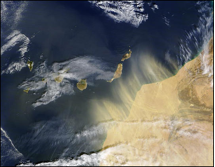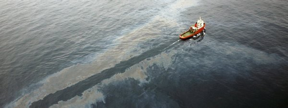Teresa Parejo Navajas
Associate Professor of Law (Carlos III de Madrid University, Spain)
Visiting Scholar at the Center for Climate Change Law
The Balearic and Canary Islands – in the Mediterranean Sea and the Atlantic Ocean, respectively – are suffering from prospectors searching their waters for hydrocarbons (mainly oil or gas). This situation has become a serious threat to the environments and economies of those regions.
1. The Canary Islands
The Canary Islands (or Canaries) form a Spanish archipelago of seven islands located just off the northwest coast of mainland Africa, 100 kilometers west of the border between Morocco and the Western Sahara. This archipelago is now in the news, not because of its beautiful subtropical weather and gorgeous volcanic beaches, but because it is exposed to a very environmentally risky project that has mobilized not only the Cabildos (the islands’ governments) and the Canary citizens[1], but also environmentalist groups from all over the world. Two years ago, an underwater volcano that appeared just off the coast of “El Hierro” (in the Southwest part of the Canaries)[2] reminded the islanders of the risks of Nature, but this time human activity is the force putting the islands in danger.
Though a collaborative effort, the Spanish company Repsol YPF S.A., the German RWE, and the Australian Woodside will start prospecting oil in the Canary Islands’ waters (in the most Eastern part of the archipelago, next to Lanzarote and Fuerteventura islands) sometime between July and September 2014, once they receive approval from the Spanish Ministry of Agriculture, Food and Environment. In order to comply with the Spanish legal system, Repsol conducted an Environmental Impact Assessment prior to the initiation of the project. Although independent Scientists have stated their opposition to the results of the EIA[3], the Ministry has not yet expressed its opinion. However, the Minister of Industry, José Manuel Soria – a native of the islands himself – has given clear support to the project, saying that the oil exploration could “introduce a new economic activity” to the islands.
These three companies have already obtained the necessary authorizations from Morocco and have started prospecting in its jurisdictional waters, which are next to the Spanish territorial waters. The supreme paradox resides in the fact that if an oil spill occurs there, it will cause the same problems as if the project was developed in the Spanish waters.
The Canary Islands’ economy centers on the tourism industry (10 million visitors in 2012), accounting for up to 80% of the gross income of the archipelago. Mr. Brufau, Chairman of the Repsol’s board, explained that the company is willing to invest over 9 billion euros for as long as the prospecting lasts, if oil is found. Over half of that money would represent wealth for the territory where the base of operations is headquartered. Due to the economic and financial crisis, the region currently has a 33% unemployment rate. With these figures, it is easy to understand the difficulty of the political decision. However, Repsol’s plans have been rejected by the region’s government and the Cabildos of the two most affected islands, Lanzarote and Fuerteventura, which have even trying to stop them in Court, though unsuccessfully. The Islands’ representatives feel that in the event of an accident, the environmental impact would be disastrous for their territories with a high ecological value and great potential for eco-tourism. In fact, Lanzarote has been declared since 1993 a biosphere reserve by UNESCO[4].
- The Balearic Islands
The Balearics are a group of four main islands (and many minor islands surrounding them), located in the western Mediterranean Sea, near the eastern coast of the Iberian Peninsula. They are well known for their sunshine, beaches, beautiful Mediterranean scenery, and handsome old towns. In fact, UNESCO also declared Menorca, one of the islands, a biosphere reserve, since 1993[5]. The archipelago has become a tourist emporium and the top tourist destination in the western Mediterranean. The Balearic Islands received 10.4 million tourists in 2012, which places them as the second-most-visited region in Spain (after Catalonia). Some energy companies, including Repsol YPF, are preparing seismic testing in the Mediterranean Sea surrounding the islands (also affecting the coast of Valencia).
Spain strongly depends on energy imports so only a very small amount of oil is produced within the territory. The country has 689 exploratory wells (422 onshore and 267 offshore, of which more than 200 are in the Mediterranean Sea and more than 60 have been successful)[6].
The main problems with this exploration are:
- The noise caused by the seismic prospection: the European Commission has recently recognized the noise as a cause of contamination[7]. Prospecting vessels drag beneath them compressed air guns that emit sounds every 10 seconds, which penetrate the water and part of the subsoil, and then bounce back to the surface. The echoes are recorded and then used to create maps of the marine structures. This noise affects all kinds of marine animals and organisms, diminishing their life skills;
- Impacts on Fisheries: according to the Fishermen Federation of the Balearic Islands data, the seismic prospection could reduce the fishing activity in the region between 30 and 70%;
- Sea spills: the region has recently suffered an oil spill with irreparable damages. In December 2010, 60.000[8] liters of oil were dumped into the Mediterranean Sea during the start-up of an oil plant located in the Ebro Delta area. The outrage among the fishermen, ecologists, touristic companies and citizens in general is increasing, as the details of the projects are being more widely known. All the administrations of the affected regions have started to register massive allegations against the companies’ prospections.
Meanwhile, nature endures patiently.
Photo Credits: NASA images (at beginning) and lavanguardia.com (directly above)
[1] Opponents of oil exploration have launched a campaign with an online petition titled “Save the Canary Islands”, which has more than 35,000 signatures. In 2012, thousands of residents had already joined protests against the project. Abiven, K. “Oil explorer eyes Spain’s pristine Canary Islands”, December 10th, 2013. https://www.google.com/hostednews/afp/article/ALeqM5jDVyeHLe8JQoGXd2hD-Qt_Ylps0g?docId=d85ce573-53cf-48fd-a4c4-c0a09648b411 (12th of February 2014).
[2] https://www.natureworldnews.com/articles/5473/20131230/volcanic-eruption-canary-island-loom-hundreds-small-earthquakes.htm (14 of February 2014).
[3] For more information: 1) Aguilar de Soto, N. “Impacto del Proyecto de Cata y Explotación de hidrocarburos en Fondos Profundos de Canarias”, University of La Laguna (Tenerife, Canary Islands), 2005; and 2) Steiner, R. “Review of Environmental Impact Study for Repsol’s Proposed 2014 Exploratory Offshore Drilling, Canary Islands, Spain”, University of Alaska, September 2013.
[4] https://www.unesco.org/mabdb/br/brdir/directory/biores.asp?code=SPA+12&mode=all (14th of February 2014).
[5] https://www.unesco.org/mabdb/br/brdir/directory/biores.asp?mode=all&code=SPA+13 (20th of February 2014).
[6] https://sociedad.elpais.com/sociedad/2014/02/15/actualidad/1392484770_220147.html (February 2014).
[7] Surveys have shown that, for the public, environmental noise is now as big a perceived problem as global warming. With air traffic looking set to continue increasing by 5% a year, noise pollution from aircrafts could add to this already troubling statistic. Intensive research is still required to boost political and technological progress in the field of environmental noise pollution. A European network called CALM has spent the past three years examining noise abatement research and technology to provide guidance to policy-makers in the transport and environment sectors.
https://ec.europa.eu/research/transport/projects/items/eu_tackles_noise_pollution_in_the_environment_en.htm (February 2014).


